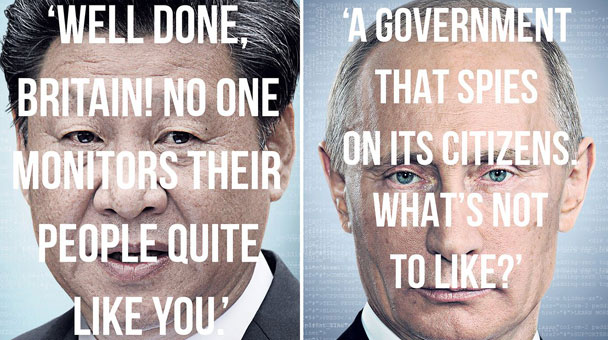
The Don’t Spy On Us coalition (of which English PEN is an executive member) today launches a provocative new advert alerting the public to the dangers of Theresa May’s proposed new surveillance powers.
The billboard advert, satirically depicting some of the world’s most notorious leaders pledging their support for the UK government’s Investigatory Powers Bill, will be displayed at major junctions in London from 10 May, with print and online adverts launched simultaneously
The unprecedented coalition of civil liberties organisations believes the Investigatory Powers Bill, currently going through parliament, will make the UK a world leader in surveillance and inspire tyrants like Vladimir Putin and Robert Mugabe.
The legislation would grant government agencies powers to spy on innocent British people, powers campaigners say have no place in a democracy.
“The UK government should be leading the way in guaranteeing safe and secure communications for everyone,” says Eric King, director of Don’t Spy On Us. “Instead it is providing examples for dictators and across the world.
“When China introduced controversial sweeping surveillance powers just a few months ago its government claimed it was doing ‘basically the same as what other major countries in the world do.’ Oppressive regimes are already following our lead.”
The Investigatory Powers Bill will:
- Give the police the power to read your internet browsing history, even if you are entirely innocent of any crime.
- Allow the intelligence agencies and the police the power to hack your personal devices, from the camera and microphone on your smartphone or smart TV, to your laptop or desktop.
- Make it illegal to tell a journalist that you’ve been served with a surveillance warrant.
The Don’t Spy On Us coalition is asking everyone who cares about their privacy to sign the Don’t Spy On Us petition against the Investigatory Powers Bill and let MPs know that this law has no place in a democracy. There is still time to change the Investigatory Powers Bill and make a law that will safeguard both security and privacy.